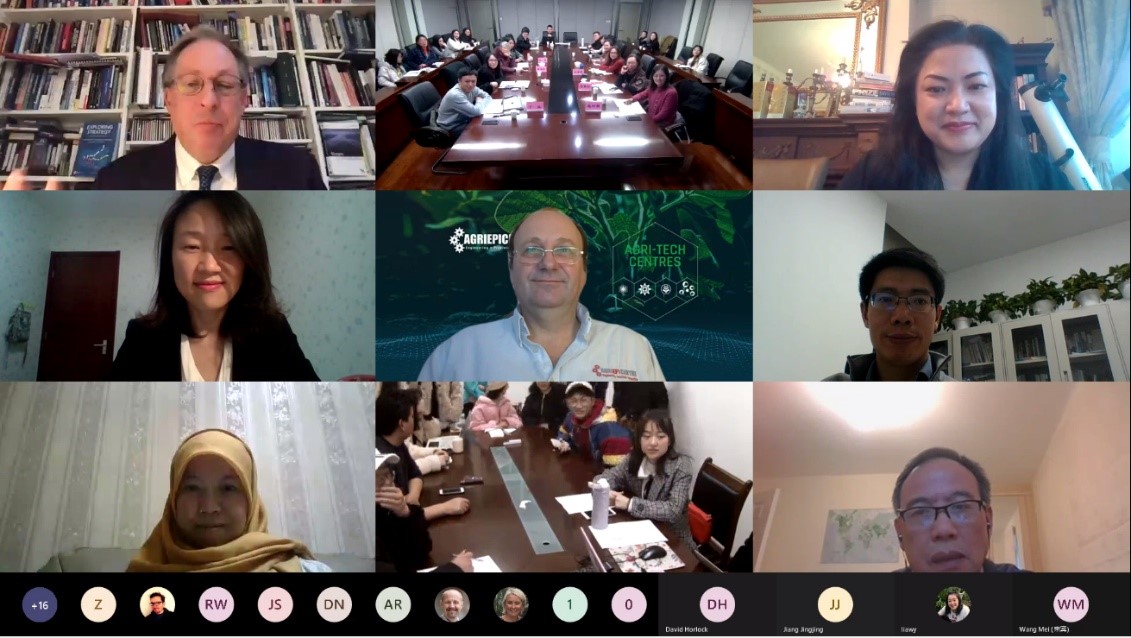
December 8, 2020, by aczjb1
Exploration of challenge-oriented research and social impact in rural China: GCRF pilot project event report – Dr Bin Wu
A challenge facing the developing world is helping 500 million small farmers to better adapt and integrate into external markets for sustainable livelihoods. Given nearly half of the world’s small farmers live in China, the Chinese government has made poverty alleviation one of its aims over the past decade. As part of this, the University of Nottingham Global Challenge Research Fund (UoN-GCRF) was awarded a pilot project – Cooperative ecosystem to empower small farmers in China to address the challenge through case studies in the poor areas of Sichuan which represent the poor areas of west China. As the GCRF project is due for completion by the end of December 2020, with the national campaign against poverty alleviation in rural China ending at the same time, an online international event was held on 3 and 4 December 2020 entitled: Cooperative Ecosystems for Rural Revitalisation in Poor Areas of China.
Over 160 delegates from China, UK, Malaysia, India, Indonesia, Australia and African countries attended with, many senior figures contributing to this event including: Mr Stuart Dunn, Head of Agriculture, Food & Drink Trade China, Department for International Trade, British Consulate-General Shanghai; Dr Min Tang, State Councillor, Deputy Chair of YouChange China Social Entrepreneur Foundation; Mr David Horlock, Managing Director of Global Food and Retail Supply Chain, British Standards Institution (BSI); Dr Johnathan Snape, Head of James Hutton Ltd, Professor Dave Ross, CEO of Agricultural Engineering Precision Innovation Centre (Agri-EPI). Other distinguished speakers included representatives from Sichuan Agricultural University, Chinese Academy of Social Sciences, Chinese Academy of Agricultural Sciences; China Agricultural University, Centre for International Knowledge on Development (CIKD), and British Consulate-Generate Chongqing.
They expressed not only interest in the research findings and methodology adopted by the GCRF project in focusing on the challenges and local solutions for poverty alleviation in the marginal areas of China, but also business opportunities to develop UK-China partnerships along the line of sustainable agriculture, rural development and entrepreneurship in less developed regions of China.
The primary aim of this event was to examine and disseminate research findings from empirical studies of this project conducted in marginal areas of Sichuan and other provinces. The outcomes include 11 academic papers and nine presentations to tackle a range of challenges facing rural communities in this region, including: talent shortage, knowledge and attitude to external market, financial and credit bottleneck, cooperation spirit, etc. To remove above barriers and initiate a process of cooperative development there, an external intervention is inevitable and the “grand poverty alleviation” initiated by China’s government five years ago has offered opportunities for all sectors (including to NGOs and urban voluntary groups) to participate in poverty alleviation in which cooperative development has been listed as an in important element or criterion for project evaluation. This offers a unique opportunity for development scholars to examine: to what extents have external intervention (both government and non-government) at various levels led to a successful initiative and sustainable cooperative development? Furthermore, by what conditions can the external intervention (no matter if government or nongovernment led) be successful or failed?
The above questions were addressed by collecting and analysing good and representative cases in a range of industries (main crops, potato, honey, fruit, tourism), topography (plain, hills and high mountains) and locations (Sichuan, Yunnan and Guizhou) and ethnic groups (e.g. Tibetan, Yi, Yao Minorities). Empirical events presented in this report have challenged convenient cooperative research driven by cooperative principles based upon western experience. This often rejects or ignores good practice in developing countries where government intervention becomes an important element, at least in the initiative stage. Not limited to the context of rural China, this project demonstrates the value of an ecosystem approach for the research design, social impact and data analysis for better understanding the complicated issues in marginal areas of the developing world.
For the goals of social impact, five social impact reports in different sectors (potato seed breeding, high quality honey, students’ participation in rural tourism, organic agriculture, and environment protection and education in the national parks) plus a student survey report on their capacity development are collected in the project report. Also included are associated case studies that were showcased at the event and presented by six stakeholders covering a range of areas from technological collaboration of the UK-China potato companies to social innovation for organic agriculture, and from international participation in rural tourism in Sichuan to China’s engagement for agricultural technology innovation in Africa. Alongside background, rationale, and activities, a roadmap or pathway to enhancing the UK-China cooperation is suggested at the end of each report or presentation.
With respect to joint action among key stakeholders in the near future, this event offered opportunities for panellists and the audience to contribute their opinions and suggestions on topics such as:
- The implications of China’s practices in poverty alleviation over the past five years for its rural revitalisation and rural sustainability in other developing countries;
- The value of an ecosystem approach for challenge-oriented, interdisciplinary and stakeholder engaged research design and implementation;
- The UK-China research collaboration along the line of SDGs, climate change and farmers’ empowerment;
- Opportunities and pathways to develop the UK-China’s business collaboration in rural tourism, organic farm and local characterised products exports from marginal areas of China;
- Joint programme in rural entrepreneurship training and competition in 2021.
You can download the full event report and programme below:
GCRF项目结题报告_最终版_FINAL Dec 2020 (Chinese)
GCRF Project Report_FINAL-December_2020 (English)
GCRF Conference Programme
No comments yet, fill out a comment to be the first

Leave a Reply